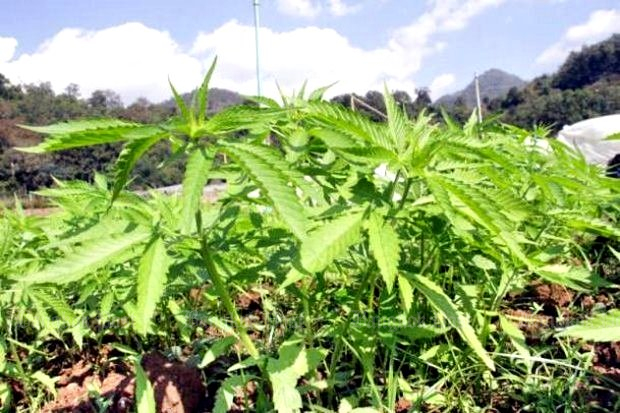
The National Legislative Assembly's (NLA) public health committee vowed Tuesday to pass proposed amendments to the Narcotics Act to legalise the growing of marijuana and kratom for medical research purposes by the end of this year.
Dr Jet Sirathraanon, chairman of the NLA's public health committee, made the statement after an NLA brainstorming session on them.
"We will accelerate the deliberation of these amendments so that we can complete them before the end of December. This will be a New Year's gift for all Thais," he said.
Proposed by a group of 44 NLA members, the amendments that will change the classification of marijuana as well as kratom (Mitragyna speciose) and allow their use for medical purposes has so far received overwhelming support from the public.
A total of 16,431 people have responded to an official online survey, 16,288 (99.13%) of whom supported the proposed amendments, said Somchai Sawaengkan, an NLA member.
NLA president Pornpetch Wichitcholchai, however, stressed the importance of taking sufficient time to court further public opinion on them and then weigh the advantages and disadvantages.
"In the end, we have to find out how to allow [these narcotics plants] to be used for medical research without adversely affecting society," he said.
Dr Jet said attempts to remove marijuana from the list of illegal drugs have been made for quite some time, but calls have recently grown for cultivating the plant to be legalised.
If the proposed amendments are rejected this time, the country will have to wait until it has a new government before any new ones are resubmitted to parliament, he said.
Marijuana extracts have been shown in studies by the Public Health Ministry to be effective in treating the symptoms of certain physical conditions including peripheral neuropathy, epilepsy and muscle stiffness, said Dr Jet.
Peripheral neuropathy refers to the conditions that result when nerves that carry messages to and from the brain and to the rest of the body are damaged or diseased.
As for the treatment of cancer, he said, there have not been any study results to confirm marijuana's effectiveness in curing it, he said.
Mr Somchai admitted that the proposed amendments may contain unforeseen loopholes that need to be fixed to prevent transnational pharmaceutical companies from exploiting them to reap benefits from marijuana studies in Thailand.
There is also potential for the use of marijuana for medical purposes in Thai traditional medicine, said Dr Marut Chirasetthasiri, director-general of the Department of Developmental Medicine and Alternative Medicine.
In cancer patients suffering from nausea as a side effect of chemotherapy, marijuana has proven effective in relieving that symptom, said the doctor.
Former National Anti-Corruption Commission (NACC) member Vicha Mahakhun said he had observed a shift in the public perception of marijuana over the past few years.
Aside from marijuana, kratom is another medically benficial plant that should be legalised, he said.
Many rubber growers in the South drink the juice of boiled kratom leaves to boost their energy and mental alertness when waking up early in the morning to go out rubber tapping, he said.
Wirat Kalayasiri, a former Democrat Party MP for the southern province of Songkhla, agreed with Mr Vicha, saying the proposed amendments to the narcotics law should also ensure public access to these plants to prevent large pharmaceutical companies dominating this new market.